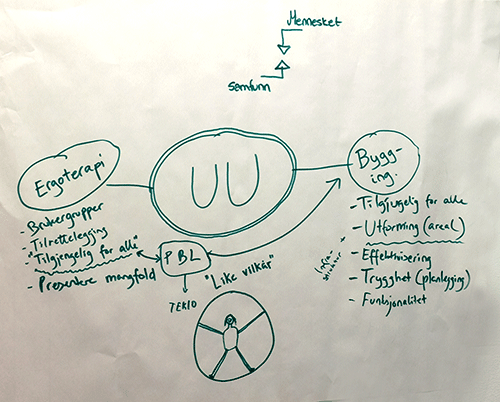Universal design as a theme in higher education
DOI:
https://doi.org/10.7577/formakademisk.1330Keywords:
Universal Design, knowledge development, interdisciplinary education, collaboration, occupational therapy, civil engineeringAbstract
To ensure opportunities for the participation and welfare for all, society is dependent on the development of knowledge and interaction between different sectors of society. Universities and university colleges are arenas for education where knowledge is developed, trained and applied to enable students to deal with challenges that must be resolved for the benefit of society. Universal design is adopted in several laws and regulations as an obligation to carry out new measures. This requires knowledge of how to work with universal design in practice. In this article we describe the experiences of a three-year collaboration in education in universal design between programs in occupational therapy and civil engineering. The purpose was to provide students with knowledge of each other's field of knowledge and methods to contribute to a shared knowledge base of universal design within each subject. By analyzing specific areas or tasks students should justify and critically reflect on universal design. Further, the purpose is to strengthen universal design as a theme in research and education. Students valued highly to get to know and work with each other, and they found that their own profession did not have a knowledge monopoly on universal design. Students found that other professions have different knowledge base, and that the interdisciplinary cooperation gave insight into the complementary knowledge that can be valuable in a future professional work with universal design.

Downloads
Published
How to Cite
Issue
Section
License
Authors who publish with this journal agree to the following terms:
- Authors retain copyright and grant the journal right of first publication with the work simultaneously licensed under a Creative Commons Attribution 4.0 License that allows others to share the work with an acknowledgement of the work's authorship and initial publication in this journal.
- Authors are able to enter into separate, additional contractual arrangements for the non-exclusive distribution of the journal's published version of the work (e.g., post it to an institutional repository or publish it in a book), with an acknowledgement of its initial publication in this journal.
- Authors are permitted and encouraged to post their work online (e.g., in institutional repositories or on their website) prior to and during the submission process, as it can lead to productive exchanges, as well as earlier and greater citation of published work (See The Effect of Open Access).
- The author(s) must manage their economic reproduction rights to any third party.
- The journal makes no financial or other compensation for submissions, unless a separate agreement regarding this matter has been made with the author(s).
- The journal is obliged to archive the manuscript (including metadata) in its originally published digital form for at least a suitable amount of time in which the manuscript can be accessed via a long-term archive for digital material, such as in the Norwegian universities’ institutional archives within the framework of the NORA partnership.
The material will be published OpenAccess with a Creative Commons 4.0 License which allows anyone to read, share and adapt the content, even commercially under the licence terms:
This work needs to be appropriately attributed/credited, a link must be provided to the CC-BY 4.0 licence, and changes made need to be indicated in a reasonable manner, but not in any way that suggests that the licensor endorses you or your use.



